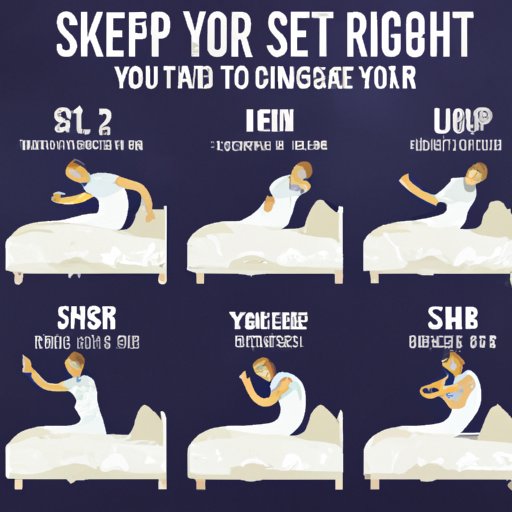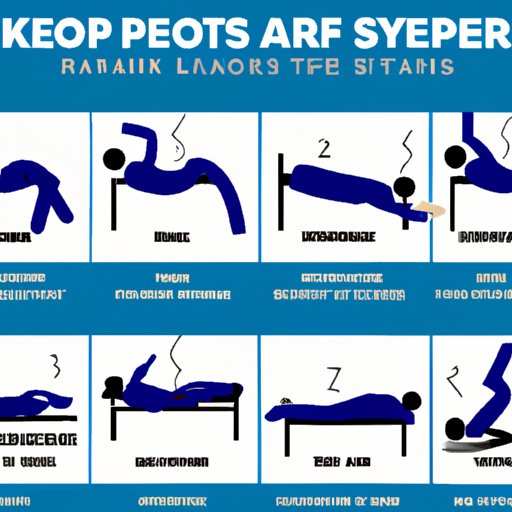Introduction
When it comes to getting a good night’s rest, it’s easy to overlook one of the most important factors – your sleep position. While many people don’t give much thought to how they position themselves when they hit the hay, the truth is that the way you sleep can have a big impact on the quality of your sleep and even your overall health. In this article, we’ll be taking a closer look at what the best position to sleep is, as well as exploring the pros and cons of different sleep positions.
Exploring the Pros and Cons of Different Sleeping Positions
When it comes to sleep positions, there are three main ones: side sleeping, back sleeping, and stomach sleeping. Each position has its own pros and cons, so it’s important to consider all of them before deciding which one is best for you.
Side Sleeping
Side sleeping is the most popular sleep position, with around 41% of people choosing to sleep on their sides. Side sleeping has several benefits, including reducing snoring, helping to keep airways open, and reducing acid reflux. However, some people may find that side sleeping can put too much pressure on their hips, shoulders, and neck, leading to aches and pains.
Back Sleeping
Back sleeping is the second most popular sleep position, accounting for around 17% of people. Back sleeping helps to keep the spine in a neutral position, which can help to reduce back pain. It also helps to keep the head and neck in alignment, which can help to reduce snoring. However, back sleeping can make it difficult to breathe and can cause neck and back pain in some people.
Stomach Sleeping
Stomach sleeping is the least popular sleep position, with only about 9% of people choosing to sleep on their stomachs. Stomach sleeping can be beneficial in that it helps to keep the head and neck in alignment, which can reduce snoring. However, stomach sleeping can cause neck and back pain, as well as putting unnecessary strain on the spine.
A Comprehensive Guide to the Health Benefits of Different Sleep Positions
Now that we’ve explored the pros and cons of different sleep positions, let’s take a closer look at the health benefits associated with each one.
Side Sleeping
According to research from the University of Rochester Medical Center, side sleeping is the best position for your overall health. Side sleeping helps to keep the spine in a neutral position, which can help to reduce back pain. It can also help to reduce acid reflux and may even help to reduce snoring. Additionally, side sleeping can help to improve circulation and may even reduce the risk of developing certain medical conditions such as heart disease and stroke.
Back Sleeping
Back sleeping is beneficial in that it helps to keep the head and neck in alignment, which can help to reduce snoring. Additionally, back sleeping can help to reduce lower back pain, as it helps to keep the spine in a neutral position. However, it’s important to note that back sleeping can make it more difficult to breathe, so it’s not recommended for people with respiratory problems.
Stomach Sleeping
Stomach sleeping can be beneficial in that it helps to keep the head and neck in alignment, which can help to reduce snoring. Additionally, stomach sleeping can help to reduce neck pain, as it keeps the neck in a neutral position. However, it’s important to note that stomach sleeping can cause back pain, as it puts unnecessary strain on the spine.

How to Find the Right Sleep Position for You
Now that we’ve explored the health benefits of different sleep positions, let’s take a look at how you can find the right sleep position for you. Here are a few things to consider when determining which sleep position is best for you.
Consider Your Health
The first thing to consider when determining the best sleep position for you is your health. If you suffer from any medical conditions, such as asthma or acid reflux, then you should talk to your doctor about which sleep position is best for you. Additionally, if you have any chronic pain or stiffness, then you should consider sleeping in a position that will help to reduce the pain.
Consider Your Comfort Level
The next thing to consider when choosing a sleep position is your comfort level. Everyone is different, so it’s important to find a sleep position that feels comfortable for you. If you find that a certain position causes you discomfort or pain, then you should try a different one.
Consider Your Sleep Environment
Finally, it’s important to consider your sleep environment when choosing a sleep position. For example, if you live in a hot climate, then you may want to opt for a position that will help keep you cool, such as side sleeping. Additionally, if you share a bed with a partner, then you may want to opt for a position that won’t disturb them, such as back sleeping.
Which Sleeping Positions Lead to the Best Night’s Rest?
Now that we’ve explored how to find the right sleep position for you, let’s take a look at which sleeping positions lead to the best night’s rest.
Side Sleeping
Side sleeping is generally considered to be the best sleep position for most people, as it helps to reduce snoring, improve circulation, and reduce acid reflux. Additionally, side sleeping can help to reduce back pain and may even help to reduce the risk of developing certain medical conditions such as heart disease and stroke.
Back Sleeping
Back sleeping is beneficial in that it helps to keep the head and neck in alignment, which can help to reduce snoring. Additionally, back sleeping can help to reduce lower back pain, as it helps to keep the spine in a neutral position. However, it’s important to note that back sleeping can make it more difficult to breathe, so it’s not recommended for people with respiratory problems.
Stomach Sleeping
Stomach sleeping can be beneficial in that it helps to keep the head and neck in alignment, which can help to reduce snoring. Additionally, stomach sleeping can help to reduce neck pain, as it keeps the neck in a neutral position. However, it’s important to note that stomach sleeping can cause back pain, as it puts unnecessary strain on the spine.
The Surprising Link Between Sleep Positions and Health
In addition to helping you get a good night’s rest, sleep positions can also have a positive effect on your health. Here are a few of the surprising ways in which sleep positions can improve your health.
Improved Circulation
One of the biggest benefits of sleeping in the right position is improved circulation. Studies have shown that sleeping on your side can help to increase blood flow, which can help to reduce the risk of developing certain medical conditions such as heart disease and stroke.
Reduced Back Pain
Sleeping in the wrong position can cause back pain, but sleeping in the right position can help to reduce it. For example, sleeping on your back can help to keep the spine in a neutral position, which can help to reduce lower back pain. Additionally, sleeping on your side can help to reduce pressure on the spine, which can help to reduce upper back pain.
Improved Digestion
Sleeping in the right position can also help to improve digestion. Research has shown that sleeping on your left side can help to promote better digestion, as it helps to keep the stomach in an upright position, which can help to reduce acid reflux.
Better Posture
Finally, sleeping in the right position can help to improve your posture. When you sleep in the wrong position, it can cause your muscles to become tense and stiff, which can lead to poor posture. However, sleeping in the right position can help to relax your muscles, which can help to improve your posture.

An Overview of the Most Popular Sleep Positions
Now that we’ve explored the surprising link between sleep positions and health, let’s take a quick look at the three most popular sleep positions.
Side Sleeping
Side sleeping is the most popular sleep position, with around 41% of people choosing to sleep on their sides. Side sleeping helps to keep the spine in a neutral position, which can help to reduce back pain. It can also help to reduce acid reflux and may even help to reduce snoring.
Back Sleeping
Back sleeping is the second most popular sleep position, accounting for around 17% of people. Back sleeping helps to keep the head and neck in alignment, which can help to reduce snoring. Additionally, back sleeping can help to reduce lower back pain, as it helps to keep the spine in a neutral position.
Stomach Sleeping
Stomach sleeping is the least popular sleep position, with only about 9% of people choosing to sleep on their stomachs. Stomach sleeping helps to keep the head and neck in alignment, which can help to reduce snoring. Additionally, stomach sleeping can help to reduce neck pain, as it keeps the neck in a neutral position.

What Your Sleep Position Says About Your Personality
Your sleep position can tell you a lot about yourself, as each position has its own unique traits and characteristics. Here’s a quick overview of what your sleep position says about your personality.
Side Sleepers
Side sleepers are often seen as independent and self-reliant. They tend to be creative thinkers who like to take their time and make decisions carefully. Additionally, side sleepers are typically considered to be good listeners who are empathetic and understanding.
Back Sleepers
Back sleepers are often seen as logical and analytical. They tend to be detail-oriented and organized, and they’re usually good problem solvers. Additionally, back sleepers are typically considered to be reliable and responsible.
Stomach Sleepers
Stomach sleepers are often seen as outgoing and adventurous. They tend to be spontaneous and fun-loving, and they usually enjoy trying new things. Additionally, stomach sleepers are typically considered to be confident and assertive.
Conclusion
In conclusion, it’s clear that your sleep position can have a big impact on the quality of your sleep and even your overall health. We’ve explored the pros and cons of different sleep positions, as well as the health benefits associated with each one. We’ve also discussed how to find the right sleep position for you, as well as the surprising link between sleep positions and health. Finally, we’ve taken a look at what your sleep position says about your personality. So, if you’re looking to get a good night’s rest and improve your overall health, then it’s important to find the right sleep position for you.
(Note: Is this article not meeting your expectations? Do you have knowledge or insights to share? Unlock new opportunities and expand your reach by joining our authors team. Click Registration to join us and share your expertise with our readers.)
